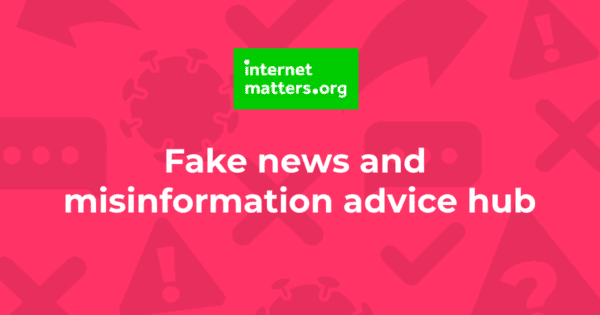- It comes as Internet Matters has launched an online hub, in partnership with Google, to help inform and educate parents
- New research shows 75% of parents are concerned about fake news, but only 16% have spoken to their children about how to spot it
- And over a third 36% are worried their kids are exposed to misinformation about Covid-19
Over a third (36%) of parents say that they are most worried about their children seeing fake information about coronavirus. This scored higher than any other misinformation concern including; hoax internet challenges (33%), terrorism (33%) and false medical and health-related advice, such as the cure for cancer (28%).
The report comes as Internet Matters launches an online hub to help tackle fake news and the spread of misinformation online.
Overall, the study found that whilst three-quarters (75%) of parents are concerned about fake news, only 16% have had a conversation with their children about how to identify fake news in recent months.
These concerns and experiences were found to be even more paramount to parents of vulnerable children. However, these parents are more likely to be aware of fact-checking websites, to help combat separating fact from fiction.
When parents were asked what negative impacts they were most worried about following exposure to fake news, over a third (34%) said they were concerned it would make their children worried or anxious.
And over a quarter believe it may distort or confuse their view of the world (27%), or draw them into the ‘wrong crowd’ at school (27%).
Internet Matters’ ‘Tackling fake news and misinformation’ advice hub, launched with support from Google, will help inform and educate parents and carers with strategies to empower children and young people to recognise and report misinformation online. The online hub will offer top tips, resources and expert advice, including content from one of the organisation’s experts Prof William Watkin, on the issue.
Carolyn Bunting, CEO of Internet Matters, said: “This research highlights that parents are understandably worried that their children may find it harder to separate fact from fiction, especially in relation to Covid-19.
“It’s why it’s so important to help them make sense of what they see online, encouraging them to think carefully about what they see and hear online.
“For example, help them check the source of the information and discuss the impact of reposting or sharing false information. There are also tech tools on platforms you can use to help limit their news feed and manage what they see.”
“We always advise parents to have regular conversations with their children about online safety issues.
Fake news expert, Prof William Watkin of Brunel University, said: “Fake news and misinformation is a growing problem for parents. The ever-changing digital landscape is making it increasingly hard for parents to keep up.
“But by helping children distinguish between what’s real and what’s fake, you can help them develop critical thinking and digital literacy.
“Talk to them about what to look out for when they are online, such as what is the story is trying to say and how the story makes them feel – often fake news will try and manipulate people’s feeling in order for them to click.
“Also, get them to check things like the URL and the imagery included, and let them know even if it has been shared by a friend or influencer, it doesn’t mean it is real.
“You can’t shield your child from the misinformation that is out there, but you can teach them how to read it, respond to it, and, if necessary, report it.”
For more information and resources on fake news and misinformation visit the Tackling fake news and misinformation hub.
NOTES FOR EDITORS
*Research was commissioned by Internet Matters as part of its Impact Tracking by third-party research partner Opinium in October 2020, who surveyed 2,006 UK parents.
About Internet Matters
Internet Matters (internetmatters.org) is a not-for-profit, industry-funded members body that helps families stay safe online, providing resources for parents, carers and educational professionals. It was established in 2014 by BT, Sky, TalkTalk and Virgin Media and its members include BBC, Google, Samsung, Facebook, Huawei, ByteDance, Supercell and ESET. It is a member of the Executive Board of UKCIS (UK Council for Internet Safety), where it leads the working group for vulnerable users and was a member of The Royal Foundation Taskforce on the Prevention of Cyberbullying, founded by the Duke of Cambridge. It works with partners from across the industry, government and third sector to raise awareness and provide advice on the issues affecting children in the digital age, including cyberbullying, screen time, digital resilience, extreme content, privacy and exploitation.
Media Contacts for Internet Matters
Katie Louden
[email protected]
Mobile: 07850428214





